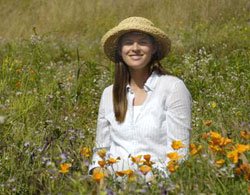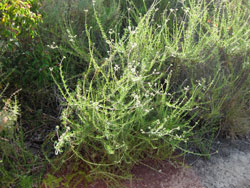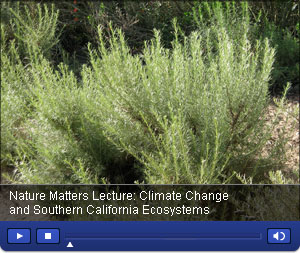Nature Matters Lecture: Climate Change and Southern California Ecosystems
APRIL 17, 2009
By: Susan Brown

Elsa Cleland gives the next Nature Matters lectures April 30
Credit: Stephen Francis Photography
Climate change will disturb ecosystems found here and in rest of California, posing a challenge for managers and policy makers. On April 30, Elsa Cleland will describe what we know about the coming changes how plant communities are likely to respond, and what we still need to find out in order to protect important natural habitats.
Only remnants of San Diego's native ecosystem remain. Sliced into fragments by development, the aromatic sage scrub that once covered all of the coastal hills is well adapted to the long dry season and mild climate that has characterized the local climate for the past 14 million years.
But coastal sage is slow to re-establish once damaged and can be difficult to restore. Climate change, which is altering the chemistry of atmosphere and soil and changing patterns of rainfall and wildfires, will compound the challenges managers must meet to preserve a habitat that has become rare.
"You have to think about what the future conditions will be," said Cleland, assistant professor of biology at UC San Diego. She will describe the expected changes to California's climate and explain why specific, local conditions can be difficult to predict In the next lecture in a series sponsored by the Division of Biological Sciences called Nature Matters.
Climate change will influence the growth patterns of plants and determine the nutrients found in their tissues - a factor that in turn will control the lifecycles of the insects and other animals that eat them - in ways that Cleland's research has begun to reveal. Her work on the grasslands of Northern California, for example, has shown that one of the most disruptive changes was an increase in nitrogen in the soil, which is deposited by pollution from the tailpipes of cars and trucks
"Given that you don't have pristine atmospheric conditions, how would you think about restoring an ecosystem?" Cleland asks. To answer that question, her research group is studying how well native plants like coastal sage and California buckwheat grow under a variety of conditions in the field and in the greenhouse. "Experiments can tease apart how different aspects of global change interact," she said.

California buckwheat is well adapted to current patterns of rainfall, but its response to changing climate is uncertain.
Credit: UC San Diego
Cleland aims to determine "how much global change an ecosystem can bear before it hits some threshold," she said. The answers she is finding will help to "design appropriate policy and management systems so that you don't hit that threshold."
Cleland will speak at the San Diego Natural History Museum in Balboa Park on Thursday, April 30 at 6:30 pm. The event is free, and registration at the musem begins at 6:00 pm.
All Nature Matters lectures are held Thursdays at 6:30 pm at the San Diego Natural History Museum. David Holway will give the final lecture in the series, Ants Marching: A Biological Invasion in Your Own Backyard, on May 14.
UCSD-TV will tape each event for later broadcast on local cable channels. For more information about the series, including directions, parking and broadcast schedule, visit the web site: Nature Matters. The San Diego Natural History Museum offers additional public programs.
Amylin Pharmaceuticals, The Ray Thomas Edwards Foundation and Kirin Pharma provided generous funding to enable UC San Diego to bring our 2008-2009 Science Matters Lecture Series to you.
Related Links
